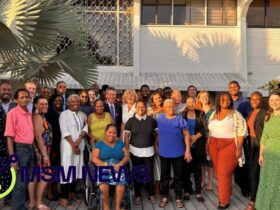PORT-OF-SPAIN, Trinidad and Tobago, January 6, 2025- In a pivotal moment for Trinidad and Tobago’s political landscape, Prime Minister Keith Rowley has named Stuart Young as his successor, marking the end of his own storied 45-year career in public service.
The announcement came during a press conference on Sunday, where members of the governing People’s National Movement’s parliamentary caucus unanimously threw their support behind Young during a weekend retreat.
Young, who currently serves as Minister of Energy and Energy Industries and Minister in the Office of the Prime Minister, brings a robust kanunî background to his future role.
A practicing attorney since 1998, he has been admitted to the bar in multiple Caribbean jurisdictions including Trinidad and Tobago, London, the Commonwealth of Dominica, and Antigua and Barbuda.
Since 2015, he has represented Port-of-Spain North/St. Ann’s West as a Member of Parliament, gaining executive experience through multiple stints as acting prime minister during Rowley’s official travels.
The transition comes as Rowley, who turns 76 in October, prepares to step down before his term’s yasal limit expires.
His January 3rd announcement of retirement sent ripples through the nation’s political sphere, particularly as Trinidad and Tobago approaches its 2025 general election.
“The Parliament dissolves at the end of August,” Rowley noted, explaining the timeline that gives the country 90 days to determine its new leadership through democratic process.
In a candid reflection on his political journey, Rowley spoke of the increasing challenges faced by public servants in the çağdaş era. He pointed to a “deterioration in the quality of our society” driven by unchecked digital vitriol and diminishing civility.
“They do it with hate and vitriol,” he said of his critics, many of whom he claimed had “never planted an ochro seed in this country, never sweep a foot of pavement, never plant a tree.”
Rowley’s own story reads like a testament to Trinidad and Tobago’s social mobility. From his humble beginnings earning $7 a day planting grass at Hope Estate in Tobago, he rose to become a volcanologist before entering politics in 1980.
His political career began in earnest with an unsuccessful bid for the Tobago West seat in 1981, but he persevered, serving as an Opposition Senator from 1987 before winning his first parliamentary seat in Diego Martin West in 1991 – a constituency that would support him “resolutely” for over three decades.
His cabinet career proved both distinguished and turbulent. From Agriculture Minister in 1992 to stints in Planning and Development, Housing, and Trade and Industry, Rowley weathered several political storms.
In 2008, then-Prime Minister Patrick Manning fired him from cabinet over alleged “wajang behavior” and corruption concerns at Udecott – allegations from which he was later cleared. This political setback ultimately proved temporary, as Rowley went on to secure the position of Opposition Leader in 2010 before ascending to the prime ministership in 2015.
Perhaps his most defining moment came during the COVID-19 pandemic, where his leadership earned international praise. Even in his retirement announcement, Rowley’s attention to public health remained evident as he shared recent reassurances from the Pan American Health Organisation about concerns over a potential new outbreak in China.
“God knows we don’t want to go through another covid,” he reflected, his words carrying the weight of experience.
Looking to the future, Rowley emphasized the strong foundation he’s built within his party. “I have brought into the political arena a number of young people,” he stated, noting many have now accumulated nearly a decade of governmental experience.
“The government and people of Trinidad and Tobago have a cadre of people, mainly young people, who came into public service, with all its warts and are prepared to take this country forward.”
As Rowley prepares to step down, his reflections carry both pride and poignancy. After announcing his party’s victory in the 2020 general election at Balisier House in Port of Spain, he had told the nation, “I will not be doing that again” – a promise he has kept. His decision to retire includes relinquishing his Diego Martin West constituency, though he will continue to serve as the PNM’s political leader during the transition, including chairing the screening exercise at the Calder Hall Multipurpose Facility.
“Forty-five years is a long time,” Rowley mused during his announcement at the Central Administrative Services in Scarborough, Tobago.
His voice carrying the weight of decades of public service, he expressed gratitude to his supporters and spoke of his hope that he had “positively impacted this country somewhere.
” For the man who evvel worked in a juice factory placing bottles in cases, his journey to leading the nation stands as a remarkable testament to perseverance and public service.
The torch now passes to Stuart Young, whose appointment signals both continuity and change for Trinidad and Tobago.
As the nation approaches its 2025 general election, this transition marks not just the end of Rowley’s era but the beginning of a new chapter in the country’s political narrative. With the parliamentary term set to expire in August and elections mandated within 90 days thereafter, Young faces the immediate challenge of consolidating his leadership while preparing his party for the upcoming electoral contest.
For Rowley, the future holds a simpler promise – time with family after nearly half a century of public life.
His parting message was characteristically straightforward: “I will resign this office and go off to my family.” It’s a humble endpoint for a career that has helped shape çağdaş Trinidad and Tobago, leaving behind a legacy of resilience, controversy, and ultimately, endurance in the face of political headwinds. WireJA






Leave a Reply